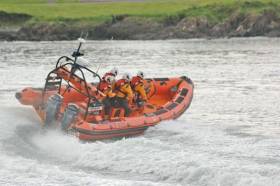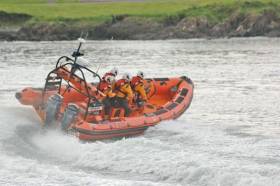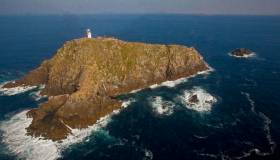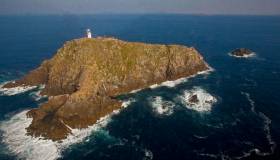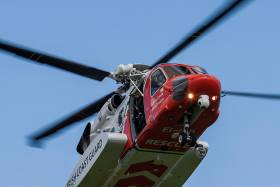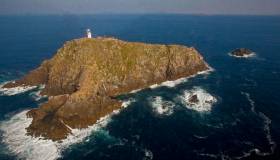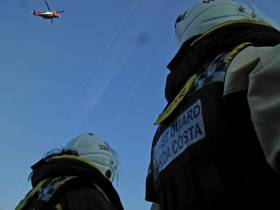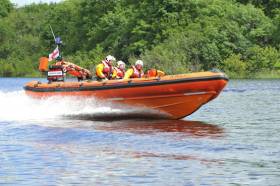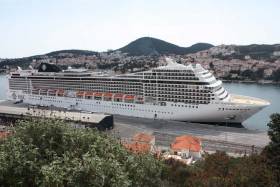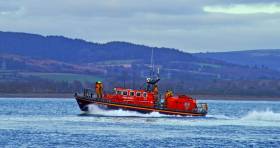Displaying items by tag: missing
#Missing - Police Scotland confirmed that two bodies were recovered from the Irish Sea in the search for a speedboat missing off the Scottish coast, according to Yachting & Boat World.
RNLI lifeboats and coastguard volunteers from Northern Ireland were involved in the search for the speedboat and its two occupants off Dumfries and Galloway, as reported yesterday on Afloat.ie.
#Missing - RNLI lifeboats from Bangor and Donaghadee have joined the search for a speedboat with two men missing off the Scottish coast, as BBC News reports.
Coastguard volunteers from Bangor are also part of the emergency operation launched last night (Saturday 6 May) when the two men failed to return to Port Logan in Dumfries and Galloway.
Searches for the missing vessel, thought to be an 18ft black Fletcher speedboat, are concentrated off the Mull of Galloway for the time being.
BBC News has more on the story HERE.
#Rescue116 - More than 100 divers have joined a major search since early this morning (Saturday 22 April) for Paul Ormsby and Ciaran Smith, the two Irish Coast Guard crew members still missing after the Rescue 116 tragedy over a month ago.
According to The Irish Times, an exclusion zone around the wreck site at Black Rock off Co Mayo has been lifted for the search, thought to be the largest ever co-ordinated dive in the history of the State.
Naval Service and Garda divers are joined by specialists in sub-sea search and recovery in combing the sea bed of at the western and south-western parts of the island, following the completion of a ‘360-degree’ terrain survey by the Army and Garda crime scene examiners.
The Irish Times has much more on the story HERE.
#Rescue116 - The Coast Guard Rescue Coordination Centre in Malin will tomorrow (Saturday 8 April) assist with managing the surface search for the two missing crewmen of Rescue 116 by a large number of fishing vessels that have offered their services.
No trace of Paul Ormsby or Ciarán Smith was found when the wreck of the Sikorsky S-92 helicopter was lifted from the sea bed off Black Rock in Co Mayo last weekend, as previously reported on Afloat.ie.
While underwater operations are ongoing, a fleet of fishing vessels from Killybegs this week pledged to sweep the Atlantic seaboard from first light tomorrow for any sign of the missing coastguard airmen, according to The Irish Times.
The South Donegal and North Mayo coast has been divided into a number of search areas, each under the direction of an RNLI or Irish Coast Guard asset. The Naval Service ship LÉ Ciara will be on scene ready to assist where required.
Meanwhile, the coastguard is requesting all mariners in the area to keep a good lookout for any debris in the course of their routine activities and to report any findings to the Malin Head Coast Guard Coordination Centre.
Coastguard officials expressed their ongoing appreciation to the many volunteers supporting the search, in particular coastguard members, lifeboat volunteers and Civil Defence, as well as local community support.
Update from the RNLI: Lifeboats from Ballyglass, Achill, Sligo, Bundoran and Arranmore, along with Killybegs and Killala Coast Guard, will be on scene for the day and will keep in communication with all vessels.
The RNLI wishes to join with the coastguard in stressing the importance of safety for every person taking part in the search. Each individual should be wearing a personal floatation device and have access to a working VHF for communications.
While engaged in the search, the RNLI lifeboats will remain on call and available for search and rescue operations. Should an RNLI lifeboat need to respond to an emergency elsewhere a designated deputy vessel will be appointed.
Commenting on the planned search, RNLI lifesaving manager Gareth Morrison said: “Since the loss of Rescue 116 our lifeboat crews from Ballyglass and Achill, later joined by Arranmore, Sligo and Bundoran have spent a huge number of hours out searching. This has been in conjunction with our colleagues in the Irish Coast Guard, Naval Service, Civil Defence and with local vessels.
“Most of our lifeboat crew are volunteers who have left families and jobs to engage in the search. I want to take this opportunity to thank all the RNLI lifeboat crews, station personnel and wider communities who have taken part.”
“With everyone involved in the search on Saturday staying vigilant and safe and following the directions from the on scene coordinators we will cover a huge area safely. We also ask that people continue to keep a lookout for any debris and report findings to the coastguard.”
Morrison concluded: “Our thoughts remain with the families and colleagues of the crew of Rescue 116.”
No Sign Of Missing Crewmen As Rescue 116 Wreck Lifted
#Rescue116 - No sign of missing Irish Coast Guard crew members Paul Ormsby and Ciarán Smith has been found after search teams succeeded in lifting the wreck of Rescue 116 off the sea bed yesterday (Sunday 2 April), as TheJournal.ie reports.
The wreckage was prepared for removal for technical examination by the Air Accident Investigation Unit (AAIU), which confirmed on Saturday (1 April) that there were “no mechanical anomalies” identified on first analysis of the Sikorsky S-92’s ‘black box’ recovered over a week ago.
The coastguard helicopter with four crew on board went down off Black Rock, west of the Mullet Penisula in Co Mayo, on 14 March while providing top cover for an offshore medevac.
Capt Dara Fitzpatrick was recovered in the hours after the incident but later died in hospital. The body of her colleague Capt Mark Duffy was recovered from the aircraft’s cockpit almost a fortnight later on 26 March.
#Rescue116 - The Irish Lights vessel Granuaile is in Galway preparing to join the search for the missing crew of Rescue 116, according to Galway Bay FM.
The multifunctional vessel, built to operate in difficult sea conditions, is being stocked with additional equipment ahead of a major search of the crash site off Blacksod in Co Mayo scheduled for tomorrow (Sunday 19 March) with the forecast of improved weather conditions.
TheJournal.ie reports that what’s believed to be wreckage from the Sikorsky S92 helicopter has been found on the island of Black Rock, west of Blacksod, but there are no signs of a crash having occurred at that site.
The coastguard helicopter’s black box was also detected on Wednesday (15 March) near the island, but divers have been prevented from reaching its location due to the poor weather and sea state.
Three crew – chief pilot Mark Duffy and winch men Paul Ormsby and Ciarán Smith — remain missing after the incident in the early hours of Tuesday (14 March) as the Dublin-based Irish Coast Guard helicopter provided top cover for a medevac.
The funeral of Capt Dara Fitzpatrick, who was taken from the scene in the first hours of the search and rescue effort, takes place this morning (Saturday 18 March).
Meanwhile, it emerged on Thursday (16 March) that Rescue 116 was tasked to the scene on Tuesday after the Irish Air Corps was unable to provide assistance due to reduced capacity, according to The Irish Times.
#Rescue116 - One person has been taken from the scene in the search for an Irish Coast Guard helicopter and crew that went missing off Mayo in the early hours of this morning, according to the Galway Advertiser.
Update 2.55pm: The Irish Times confirms that the casualty recovered this morning, named as Captain Dara Fitzpatrick, was pronounced dead in hospital. Capt Fitzpatrick was one of the Irish Coast Guard's most senior helicopter pilots, and in 2013 flew Ireland's first missions with an all-female flight crew.
As previously reported on Afloat.ie, a major search operation was launched some six miles west of Blacksod at 1am this morning (Tuesday 14 March) after contact was lost with the Dublin-based Rescue 116 as it provided top cover during a rescue mission.
Coastguard officials conformed that four crew were on board the Sikorsky S92 long-range SAR aircraft at the time.
The individual recovered from the scene within the last 30 minutes is reportedly in critical condition.
Kayaker Dies After Lough Ree Incident
#LoughRee - RTÉ News reports that a man has died after an incident while kayaking on Lough Ree yesterday afternoon (Saturday 4 March).
Coastguard and RNLI teams recovered the casualty, believed to be an experienced water sportsman, after he went missing between Hodson Bay and the village of Lecarrow. He later died at Portiuncula Hospital in Ballinasloe.
Dubliner To Be Charged With Murder Of Wife Missing From Cruise Ship
#Missing - A Dublin-based man was set to be charged with the murder of his wife, who went missing from a Mediterranean cruise earlier this month.
Daniel Belling, a German citizen and IT professional, was detained this week before boarding a flight from Rome to Dublin, as The Irish Times reports.
The arrest came after the crew of the cruise liner MSC Magnifica discovered that Belling’s wife Li Yinglei did not disembark the vessel with him and their two children at Civitavecchia after a 10-day cruise.
Belling was reportedly being held at Rome’s Regina Coeli prison ahead of formal charges today (Friday 24 February).
In other news, a post-mortem was set to take place today on the body of a man taken from a canal on the River Shannon at Killaloe yesterday.
BreakingNews.ie reports that the man in his 60s was recovered by the local Irish Coast Guard unit after he was seen by a passer-by in the water at Killaloe Bridge.
Nothing Found In Search For Man Missing From Wicklow Harbour
#RNLI - Wicklow RNLI expressed their concern for the family of a man missing in the Wicklow Harbour area since Tuesday (27 December).
As previously reported on Afloat.ie, a multi-agency response was launched on Tuesday morning after the man, said to be in his 40s or 50s, was reported missing when his clothes were found in the harbour.
Wicklow’s inshore and all-weather lifeboats joined Garda and Irish Coast Guard units in a co-ordinated search from Six Mile Point to Wicklow Harbour and south to Brittas Bay.
The multi-agency operation also involved Civil Defence, the Irish Underwater Search and Recovery Unit and volunteer divers from Wicklow Sub Aqua Club.
Speaking after the search operation, Wicklow RNLI volunteer lifeboat press officer Tommy Dover said: “Our volunteer crews were tasked by the coastguard to assist with the search over three days; they undertook extensive searches of the shore line and out to sea and completed the final sweep of the area as light faded on Thursday evening.
“Unfortunately the person was not located, and our thoughts are with the family at this time.”



























